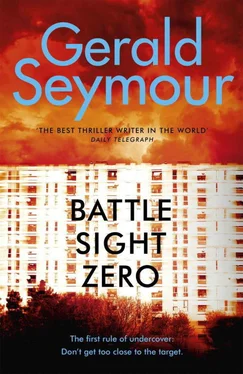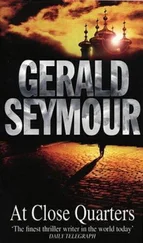‘We have an identity.’
‘And…?’
‘Sixteen years old. A juvenile court conviction, wounding with a knife at school, expelled, no qualifications, no employment.’
Samson nodded, could have written it himself. ‘And…?’
‘The woman was his mother. They came for him yesterday. A dispute.’
‘And…?’ Muffled questions through the balaclava and his eyes roved over the windows, and the roofing.
‘The mother says that she did not know which group her son worked for. Nor does she know who came for him. Nor the extent of the ‘‘crime’’ of which he was accused… What else would she say? She has to live here. We will not offer her full witness protection, guard her for the rest of her life. She is sensible… I cannot criticise her. It is the same as the last time, will be the same the next time. Not more than a quarter of an hour.’
He was alone again. He thought of the return of the vehicles to L’Évêché, and the canteen meal that would be served there… he saw the mother, very calm, surrounded by a group of older women and the communal grief suppressed, saw a boy with a withered arm who gazed at him from a clear 100 metres away, saw a man leave the project astride a Ducati Monster, saw a flatbed with a crane hoist up the burned car, saw the body driven away, saw the watchers grow bored.
Many weapons would be aimed at him. He doubted any of the kids would have the balls between their legs, sufficient courage, to aim, target him, and fire. He backed away.
The start of another day in his life, few were different. He climbed into the truck and the plated door slammed shut: it was a place where death came easily, where the assault rifle ruled.
September 1972
The boys watched, entranced.
They sat in a building of plywood walls and corrugated iron roofing. Some were sitting on the floor, concrete and covered by old rugs, some had chairs, more stood.
The transmission came from Beirut and the signal in the Tibnine area was poor and interruptions were frequent, but the flickering picture did nothing to lessen their enthusiasm – it welled and they shouted defiance.
The boys, all dressed in the camouflage now generally available to the splinter parties under the vague umbrella of the Palestine Liberation Organisation, had gathered in the ramshackle building when word had spread, a wildfire of fact and rumour, that the fedayeen had attacked the Zionist warmonger team in the Olympic Village of Munich. Only those, not many of them, with more than basic educational skills knew where Munich was, but all were loaded with the skills of how to handle, strip, reassemble and fire the AK-47 assault rifles that lay across their knees, or rested on their shoulders. They had been watching ever since the Lebanese state broadcaster had first come on air, two days before, to show flaky pictures of the Village. Each time that a member of the ‘brothers’ had been shown on the screen – small and set in an elderly wooden frame – they had cheered, raised their weapons above their heads: they had seen members of the team face off the German so-called negotiators. To have fought their way inside a heavily guarded compound, to have broken into the Israeli house, was a triumph. The commentary was at times exuberant, at other times a recital of what had already happened, the novelty fading. It was said, again and again, that a deal would be done and that many Palestinian fighters imprisoned in Israeli gaols would be freed in exchange for the athletes captured by these heroes. They had sat and stood in their places all through that day, and their mothers or sisters had brought them food in the early evening because none would willingly abandon the opportunity to watch the triumph for their people play out. Each one of them was armed. There were many weapons available now to the fighters in this camp. Most were shiny, well painted, clean, without chips or scrapes, and had been nowhere other than on an occasional hillside where it was safe to fire and on the rare exercises that were organised for them, and they were used for parade ground drills… Only one looked as though it might have been retrieved from a rubbish heap, and it stood out because it was so obviously a veteran weapon – tried, perhaps tested, one with its own history – and it was held with a degree of reverence by a slightly built young man who had only recently started to grow the first shadows of a moustache. They had sat there through the first evening, had debated how many prisoners the Zionists would need to clear from their gaols to get back their precious athletes, had calculated the scale of the victory… and had watched late at night, had wept, had cursed the deceit and treachery of the German negotiators. Had sat numbed and silent, with lips bitten in anger as the spokesman for the Olympics had told of an ambush, five heroes slaughtered, three brave men captured, an attack of extraordinary amateurishness.
They had gathered the next morning, taken their places. Little to see, but had heard that the bodies of the fallen were to be shipped back to Tripoli, the Libyan capital. They watched the TV and felt glowing pride in the sacrifice of the martyrs. The pictures now came from Libya, where dense crowds filled streets and squares. The hurdles on which the bodies lay, decorated by the host country’s flag, or the Palestinian one, were carried above the heads of the teeming mourners. The cameras were high up in buildings and looked down on to the fervour of the masses. They saw devotion, saw the worship that was accorded only to the bravest. At moments, when the camera zoomed on to a particular hurdle and showed the shallow shape of a fighter hidden by a flag, they would dive outside the building and fire off shots into the air. They would drown out the commentary of the Lebanese broadcaster with their own slogans and yells to denounce the Zionist state, the deceit of the Germans, the treachery of the United States. Their voices would rise to a hoarse frenzy, then they’d return indoors and swelter again in the heat that burned the hillsides round the camp. The transmission closed. All in the room were converts to the message of war and sacrifice. They started to disperse, and one and all would have sworn they would perform in training with more enthusiasm than ever before.
A man waited outside, seemed not to notice the heat. He picked out the boy with the old weapon, beckoned him.
He was asked, curtly, if he were prepared to volunteer for special duties. Immaterial whether he could have refused. He had stammered acceptance. The man who had waited wore old and dirt-stained clothing, fatigues, and his eyes seemed keen but tired and he squinted as if the sunlight of years’ exposure on the hillsides had damaged them. No surplus weight ringed his stomach. What was most noticeable about him was the scar that ran from his ear almost to the side of his mouth, bisecting his cheek; the wound had been inexpertly sealed and ran like a ploughed furrow. The boy would have recognised him as a fighting man, and his assessment was well placed. An experienced fighting man… Did the boy, when he came for ‘special duties’, wish for a new weapon, a replacement, one recently off a production line?
The boy grasped his rifle. His knuckles whitened. He held it tightly, proudly. The boy assumed that good words of him had been said or he would not have been approached. A hand reached towards him. The boy loosened his grip. The rifle was examined and a slow smile spread on the older man’s face. He looked for its identification. He spoke the last of the numbers, 16751, then laughed, deep and growling from his throat.
Did he know when this weapon was manufactured? The boy did not. He was told. The factory was at the industrial complex of Izhevsk which was in central USSR, a friend of the Palestinian people, and the manufacture was in the year of 1956, and there were more modern versions of the same, better built, milled and not pressed steel, but the boy was adamant. A shrug, a little sadness in the eyes of the older man, but the boy would not have noticed that, nor considered the consequences of ‘special duties’, and where he would be taken, and what task given him.
Читать дальше












